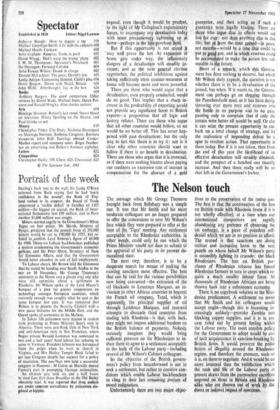Britain on the brink
Britain today stands, once again, on the brink of devaluation, anxiously negotiating a further massive loan to bolster a tottering pound. On the surface it seems as if we have been here before—sixteen months ago, to be precise, on the eve of the Government's panic July measures, when most of the same pheno- mena were present. But the differences are crucial. Then the balance of payments, al- though still in deficit, was apparently slowly improving: today it is deteriorating. Then the Prime Minister, fresh from his general election triumph, was politically able to im- pose his will on his colleagues and on the nation. Today, punch-drunk with by-election defeats on a scale never before known in British politics, his highest aim is mere sur- vival. Then the economy was booming. and it was reasonable to suppose that a relaxation of the inflationary pressure would at least provide some short-term respite for the bal 'time of payments: today industry is seeing the first glimmerings of a recovery from the recession then induced, and imports in the Months ahead are likely to rise accordingly. Then the Government still had the wage- freeze card to play : today the freeze is over. and the trade union good will that made it possible exhausted. year some £50 million tot which part repre- sents a permanent loss), against a probable overall 1967 deficit of some £250 million.
It is hardly 'surprising that the Govern- ment's policies have increasingly come under tire. It is. however, unfortunate that the bulk of the criticisms are as unreal as the Prime Minister's own assertions about the nature and success of his policies. Mr Callaghan's back-bench critics level two charges in par- ticular: that the Government is allowing the economy to stagnate when it should he pro- moting expansion, and that it is following the unspeakable course of trying to run the economy on a higher margin of unemploy- ment—the notorious 'pool.' The first charge is irrelevant, since the overriding prob- lem is the balance of payments, and expan- sion can do nothing to put that right. Indeed, until fundamental equilibrium has been re- stored to our external accounts, no expansion can be anything but hazardous and fitful.
As to the second charge, unemployment is certainly an evil per se, but if it were in fact true that an extra 150,000 men out of work —which is the difference between the present level about which Labour backbenchers are so worked up and the average during the full employment 'fifties—really would solve all our problems, end the balance of payments deficit, make stop-go a thing of the past and ensure a steady and rapid rise in living stan- dards for ever after, then this would be a small price to pay—and the Exchequer could well afford to double unemployment benefit overnight. The trouble with the Paishite 'pool' of unemployment thesis is not that it involves a slight increase in the numbers out of work: it is that it simply doesn't do the trick—as the last sixteen months have once again unequivocally shown. So far frOrn solv- expand, even though it would be prudent, in the light of MT Callaghan's expansionary forces, to accompany any devaluation today with some precautionary tightening up at home—perhaps in the hire-purchase field. But if this opportunity is not seized "; may well prove the last. As expansion at home gets under way, the inflationary dangers of a devaluation will steadily in- crease; and as the next general election approaches, the political inhibitions against taking sufficiently stern counter-measures at home will become more and more powerful.
There are those who would argue that a devaluation, even properly conducted, would do no good. This implies that a sharp in- crease in the profitability of exporting would not provide any significaot boost to British exports—a proposition that all logic and history refutes. There are those who argue that all other countries would follow, so we would be no better off. This has never hap- pened with past devaluations; but the only way to test this thesis is to try it: nor is it clear why other countries should want to follow if there is no benefit in devaluation. There are those who argue that it is immoral; as if there were nothing bizarre about paying our creditors an excessive rate of interest in compensation for the absence of a gold guarantee, and then acting as if such guarantee were legally binding. There are those who argue that its effects would not last for eve;: nor does anything else in this life; but af vast the time gained—in years, not months—would be a time that could be put to good pse, and in which reserves could be accunndglied to make the nation less vul- nerable in ;lig future.
Short of a miracle, which this Govern- ment has done nothing to deserve, but which Mr Wilson daily expects, the question is not whether there is to be a devaluation of the pound, but when. If it wants to, the Govern- ment can perhaps go on slogging through the Passchendaek mud, as it has been doing, throwing ever more men and reserves into the battle to no purpose and to no gain, pausing only to complain that if only the terrain were better all would be well. Or else it can seize the present opportunity to em- bark on a total change of strategy, and let the realisation of impending defeat be a , spur to resolute action. That opportunity is there today. But if it is not taken, then from the end of this year the likelihood of an effective devaluation will steadily diminish, and the prospect of a botched one steadily increase. And then there really will be no shot left in the Government's locker.



































 Previous page
Previous page